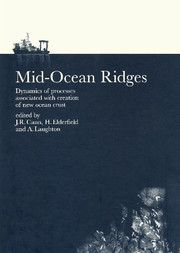Book contents
- Frontmatter
- Contents
- Preface
- Sensitivity of teleseismic body waves to mineral texture and melt in the mantle beneath a mid-ocean ridge
- Evidence for accumulated melt beneath the slow-spreading Mid-Atlantic Ridge
- An analysis of variations in isentropic melt productivity
- A review of melt migration processes in the adiabatically upwelling mantle beneath oceanic spreading ridges
- Rift-plume interaction in the North Atlantic
- The ultrafast East Pacific Rise: instability of the plate boundary and implications for accretionary processes
- Seafloor eruptions and evolution of hydrothermal fluid chemistry
- Controls on the physics and chemistry of seafloor hydrothermal circulation
- Where are the large hydrothermal sulphide deposits in the oceans?
- Sea water entrainment and fluid evolution within the TAG hydrothermal mound: evidence from analyses of anhydrite
- Thermocline penetration by buoyant plumes
- Crustal accretion and the hot vent ecosystem
- Biocatalytic transformations of hydrothermal fluids
- Index
Biocatalytic transformations of hydrothermal fluids
Published online by Cambridge University Press: 04 August 2010
- Frontmatter
- Contents
- Preface
- Sensitivity of teleseismic body waves to mineral texture and melt in the mantle beneath a mid-ocean ridge
- Evidence for accumulated melt beneath the slow-spreading Mid-Atlantic Ridge
- An analysis of variations in isentropic melt productivity
- A review of melt migration processes in the adiabatically upwelling mantle beneath oceanic spreading ridges
- Rift-plume interaction in the North Atlantic
- The ultrafast East Pacific Rise: instability of the plate boundary and implications for accretionary processes
- Seafloor eruptions and evolution of hydrothermal fluid chemistry
- Controls on the physics and chemistry of seafloor hydrothermal circulation
- Where are the large hydrothermal sulphide deposits in the oceans?
- Sea water entrainment and fluid evolution within the TAG hydrothermal mound: evidence from analyses of anhydrite
- Thermocline penetration by buoyant plumes
- Crustal accretion and the hot vent ecosystem
- Biocatalytic transformations of hydrothermal fluids
- Index
Summary
The occurrence of copious animal populations at deep-sea vents indicates an effective microbial chemosynthetic biocatalysis of hydrothermal fluids on their emission into oxygenated ambient seawater. The large metabolic and physiological diversity of microbes found at these sites, including anaerobic and aerobic hyperthermophiles, reflects an even higher variety of biocatalytic or enzymatic reactions that greatly influence deep-sea hydrothermal geochemistry.
Introduction
The extent of biocatalysis in geochemical transformations is still an enigmatic issue. Although it is well understood that processes such as microbial photosynthesis, sulphate reduction, denitrification, etc., do not occur in the absence of the responsible organisms, geochemists generally are often unclear as to the effectiveness of biocatalytic transformations, where they occur, where they cannot occur, and how can they be predicted. This dilemma is due, in part, to an incompatibility between quantitative approaches in geochemical and microbiological studies. The unexpected discovery of high chemosynthetic bacterial production of biomass near deep-sea vents has resulted in studies that led to the following clarifying remarks for geochemists on biocatalytic transformation of hydrothermal emissions.
The observations contain that certain reduced inorganic compounds may serve as biocatalytically utilizable ‘sources of energy’ wherever they occur under conditions that allow the production of enzymes through microbial growth. During the Earth's history, biochemical-physiological evolution has resulted in large numbers of biogeochemical processes that are mediated by a large microbial and, thereby, biocatalytic diversity.
- Type
- Chapter
- Information
- Mid-Ocean RidgesDynamics of Processes Associated with the Creation of New Oceanic Crust, pp. 281 - 292Publisher: Cambridge University PressPrint publication year: 1999



